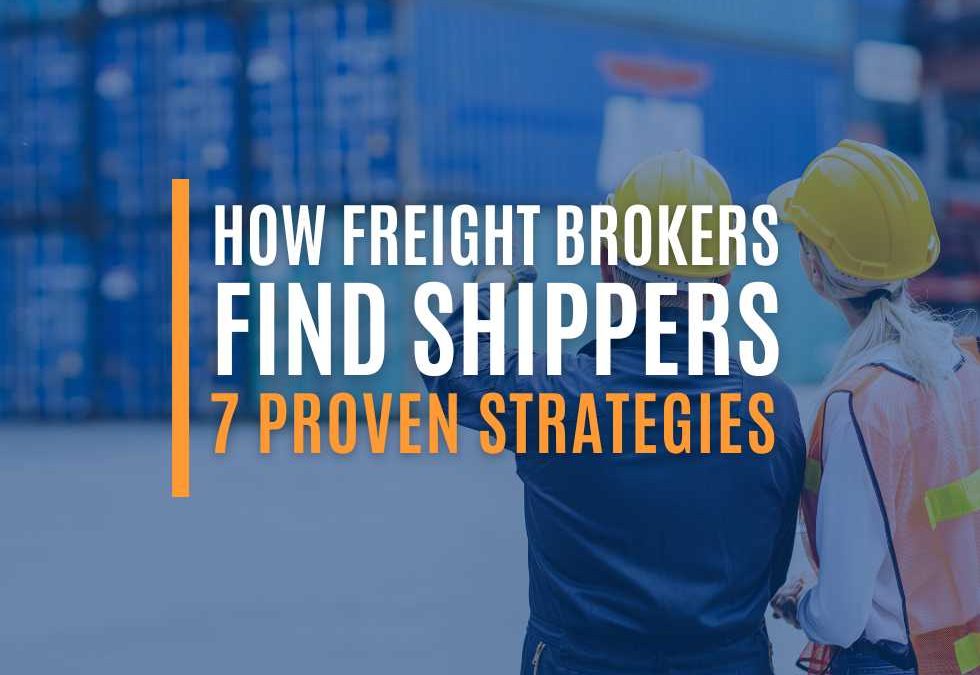Transportation is a thriving industry. Every person in the logistics chain is necessary to ensure the continued growth of our economy. Two of the key roles helping freight move from one place to another is that of a Freight Broker and Freight Agent. Both must find shippers who need freight transported and find loads to transport. So how do Freight Brokers find shippers? Let’s look into the importance of finding shippers, proactive strategies for finding shippers, and techniques for building strong relationships once the partnership is secured.
Note: In the rest of this article, we’ll be using the term “Freight Agent” instead of “Freight Broker.” Although it is common to interchange Agent and Broker, these two roles are actually different (read this article to learn the differences).
Why Finding Shippers Is Critical For Freight Brokers
A Freight Agent is an independent contractor operating under the authority of a licensed and insured Freight Broker to coordinate the transportation of goods for shippers. Agents are an essential piece of logistics because they directly manage the operational aspects of freight movement.
This means in order to earn a commission, Agents must find loads that need to be moved and even more importantly, shippers who need those loads moved. If an Agent has shippers with continual loads needing transport, they should continue to prospect for shippers with new loads to move.
Finding and building relationships with shippers can be challenging because it is a competitive market. Freight brokerages across the country each have networks of Agents who are working to secure relationships with new shippers. As such, it is critical to be proactive.
7 Strategies to Find Shippers
The best strategy to find shippers is to have multiple strategies. If an Agent is only doing one of these techniques he is limiting his business opportunities. A multi-pronged approach must be adopted.
1. Leverage Digital Tools
Utilize social media platforms like LinkedIn along with a blog for lead generation. Publish informative blog posts and articles showcasing your knowledge of the logistics industry. Answer common questions shippers ask or provide solutions to common problems. This could include creating helpful resources for shippers. If a prospective lead is researching information and your high-quality blog shows up at the top of the search engine, that could turn into a new client.
This strategy is helpful for Agents who are able to employ additional support as it is time consuming. However, Independent Freight Agents working under the authority of a trusted Freight Broker, such as Kopf, can utilize resources they already create and capitalize on their strong social presence. For instance, repost relevant content to your personal page and add your own thoughts. Then research hashtags relevant to shippers and comment on a few of those posts.
2. Explore Online Directories and Business Listings
Successful Agents understand the importance of diversifying their book of business. Explore online directories and business listings within these best industries to target. This can be as simple as doing an online search for “online directories for shippers”, “shipper lists”, or “business listings for [specific type] manufacturers.”
A few other places to search include professional websites such as:
Professional websites, online directories, and business listings have a wealth of resources for potential shipper leads.
3. Attend Industry Events
Network with potential clients at trade shows and conferences. Never underestimate the power of in-person connections. It takes tremendous effort and energy, but it can be valuable to participate in industry workshops and seminars. This helps with networking and to establish your expertise. To find events, do an online search for “trade shows for logistics” or “networking for freight brokers”.
Prepare in advance by having confident answers to these questions shippers should ask Freight Agents as well as questions you would want to ask. In every conversation focus on listening, being yourself, and provide value whenever you can. If everyone else is pitching, you may stand out by being genuine and asking questions.
4. Make Cold Calling a Routine
Yes, we have to say it. Cold calling is not dead and is a part of an effective lead generation strategy. We’ve put together some helpful resources:
- Our best cold call script
- What to do before and after the cold call
- 9 cold call questions to ask
- Cold email template
Cold calling isn’t fun and it takes consistency. Our recommendation is to set aside time each day for cold calling and simply make it part of a daily routine.
5. Make Warm Calls
These calls are easier to make because you have a common connection or previous interaction with the lead. Perhaps you met at a trade show, connected on social media, or provided service for a friend. Warm leads are more likely to convert.
Preparing for a warm call is similar to a cold call – research, research, research! When you begin the conversation, begin the conversation with your existing connection or previous interaction.
An easy way to generate a list of warm leads is to start with a list of current and past customers. Make a list of their various distributors. Then add employers of friends and family. Consider if any of those contacts require shipping. There may be untapped shipping needs within your list that your business could fill.
6. Always ask for referrals
Speaking of warm calls, don’t forget to ask current clients for referrals as well as testimonials. Referrals are gold! Keep a spreadsheet with these leads and testimonials. You never know when you might need to pull them out of your back pocket.
Another idea some Agents use is a referral incentive. For example, at the bottom of every email you send, include a referral bonus opportunity. This could be as simple as: “Ask me about my $500 referral bonus!” Each time you send an email, you include the opportunity for a customer to send a referral. Be sure to have a sell sheet ready so if someone wants to make a referral, you can provide them with your information promptly.
7. Reach Out to Similar Businesses
Make a list of your current and former customers and expand from there. Study their purchase history and research other businesses in those locations and industries. Then reach out to similar businesses. While these are not necessarily warm leads, you may have already shipped to those locations or within those industries. This boosts your credibility.
Proven Techniques for Building Long-Term Relationships with Shippers
It is worth noting you can have all the strategies in the world to find shippers, but if you don’t have excellent customer service, it won’t matter. To build strong relationships with shippers, adopt these two techniques.
1. Develop a Client-Centric Approach
Yes, the customer still knows best. Take time to understand individual shipper needs and offer customized solutions. Focus on cost savings, efficiency, and reliability that meets their needs. When you provide customized logistics solutions, customer satisfaction will increase.
2. Maintain Excellent Communication
Don’t make common communication mistakes. Instead, maintain open communication throughout the entire shipping process. Provide regular updates and address shipper concerns promptly. Be transparent even when things are not going well, but share how you are working to solve the problem. Proactive open communication is better than reactive. It builds trust which over time builds a strong relationship.
Final Thoughts
It is not always easy for Freight Brokers or Freight Agents to find shippers. Even in a competitive market, it is possible to continually fill your lead generation pipeline with shippers by following these strategies – from cold calling to exploring online directories and everything in between. Implement these techniques and you’ll be on your way to building a powerful book of business in no time.
If you are looking for more lead generation tips, read this next: How Freight Brokers Find Loads.

